#U.S. Constitution
Text
"The Constitution is not a living organism. It's a legal document, and it says what it says and doesn't say what it doesn't say."
Antonin Scalia (1936-2016) U.S. Supreme court justice.
462 notes
·
View notes
Text
"Twenty men have served as the chairman of the Joint Chiefs since the position was created after World War II. Until Milley, none had been forced to confront the possibility that a President would try to foment or provoke a coup in order to illegally remain in office. A plain reading of the record shows that in the chaotic period before and after the 2020 election, Milley did as much, or more, than any other American to defend the constitutional order, to prevent the military from being deployed against the American people, and to forestall the eruption of wars with America's nuclear-armed adversaries. Along the way, Milley deflected Trump's exhortations to have the U.S. military ignore, and even on occasion commit, war crimes. Milley and other military officers deserve praise for protecting democracy, but their actions should also cause deep unease. In the American system, it is the voters, the courts, and Congress that are meant to serve as checks on a President's behavior, not the generals."
#History#The Atlantic#Jeffrey Goldberg#Mark Milley#General Milley#Chairman of the Joint Chiefs of Staff#U.S. Military#U.S. Constitution#President Trump#Donald Trump#Trump Administration#January 6th Insurrection#2020 Election#Politics#Law#Democracy
116 notes
·
View notes
Text
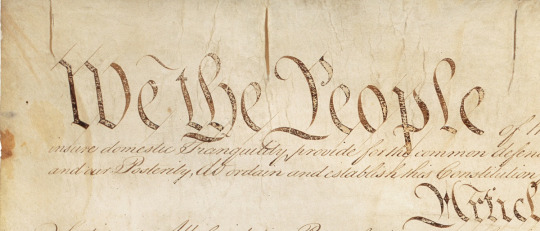

Happy Constitution Day!
Can’t make it to the National Archives Building in person? Check out the hi-res scans in our catalog:
Record Group 11: General Records of the United States Government
Series: The Constitution of the United States
Image description: Zoomed-in portion of the first page of the U.S. Constitution, including the words “We the People.”
Transcription:
We the People of the United States in order to form a more perfect Union, establish Justice, insure domestic Tranquility, provide for the common defense, promote the general Welfare, and secure the Blessings of Liberty to ourselves and our Posterity, do ordain and establish this Constitution for the United States of America.
Article. I.
Section.1. All Legislative Powers herein granted shall be vested in a Congress of the United States, which shall consist of a Senate and House of Representatives.
Section.2. The House of Representatives shall be composed of Members chosen every second year by the People of the several States, and the Electors in each State shall have the Qualifications requisite for Electors of the most numerous Branch of the State Legislature.
No Person shall be a Representative who shall not have attained the Age of twenty-five Years, and been seven Years a Citizen of the United States, and who shall not, when elected, be an Inhabitant of that State in which he shall be chosen.
Representatives and direct Taxes shall be apportioned among the several States which may be included within this Union, according to their respective Numbers, which shall be determined by adding to the whole Number of free Persons, including those bound to Service for a Term of Years, and excluding Indians not taxed, three fifths of all other Persons. The actual Enumeration shall be be made within three Years after the first Meeting of the Congress of the United States, and within every subsequent Term of ten Years, in such Manner as they shall by Law direct. The Number of Representatives shall not exceed one for every thirty Thousand, but each State shall have at Least one Representative; and until such enumeration shall be made, the State of New Hampshire shall be entitled to chuse three, Massachusetts eight, Rhode-Island and Providence Plantations one, Connecticut five, New-York six, New Jersey four, Pennsylvania eight, Delaware one, Maryland six, Virginia ten, North Carolina five, South Carolina five, and Georgia three.
When vacancies happen in the Representation from any State, the Executive Authority thereof shall issue Writs of Election to fill such Vacancies.
The House of Representatives shall chuse their Speaker and other Officers; and shall have the sole Power of Impeachment.
Section.3. The Senate of the United States shall be composed of two Senators from each State, chosen by the Legislature thereof, for six Years; and each Senator shall have one Vote.
Immediately after they shall be assembled in Consequence of the first Election, they shall be divided as equally as may be into three Classes. The Seats of the Senators of the first Class shall be vacated at the Expiration of the second Year, of the second Class at the Expiration of the fourth Year, and of the third Class at the Expiration of the sixth Year, so that one third may be chosen every second Year; and if Vacancies happen by Resignation, or otherwise, during the Recess of the Legislature of any State, the Executive thereof may make temporary Appointments until the next Meeting of the Legislature, which shall then fill such Vacancies.
No Person shall be a Senator who shall not have attained to the Age of thirty Years, and been nine Years a Citizen of the United States, and who shall not, when elected, be an Inhabitant of that State for which he shall be chosen.
The Vice President of the United States shall be President of the Senate, but shall have no Vote, unless they be equally divided.
The Senate shall chuse their other Officers, and also a President pro tempore, in the Absence of the Vice President, or when he shall exercise the Office of President of the United States.
The Senate shall have the sole Power to try all Impeachments. When sitting for that Purpose, they shall be on Oath or Affirmation. When the President of the United States is tried, the Chief Justice shall preside: And no Person shall be convicted without the Concurrence of two thirds of the Members present.
Judgment in Cases of Impeachment shall not extend further than to removal from Office, and disqualification to hold and enjoy any Office of honor, Trust or Profit under the United States: but the Party convicted shall nevertheless be liable and subject to Indictment, Trial, Judgment and Punishment, according to Law.
Section.4. The Times, Places and Manner of holding Elections for Senators and Representatives, shall be prescribed in each State by the Legislature thereof; but the Congress may at any time by Law make or alter such Regulations, except as to the Places of chusing Senators.
The Congress shall assemble at least once in every Year, and such Meeting shall be on the first Monday in December, unless they shall by Law appoint a different Day.
Section.5. Each House shall be the Judge of the Elections, Returns and Qualifications of its own Members, and a Majority of each shall constitute a Quorum to do Business; but a smaller Number may adjourn from day to day, and maybe authorized to compel the Attendance of absent Members, in such Manner, and under such Penalties as each House may provide.
Each House may determine the Rules of its Proceedings, punish its Members for disorderly Behaviour, and, with the Concurrence of two thirds, expel a Member.
Each House shall keep a Journal of its Proceedings, and from time to time publish the same, excepting such Parts as may in their Judgment require Secrecy; and the Yeas and Nays of the Members of either House on any question shall, at the Desire of one-fifth of those Present, be entered on the Journal.
Neither House, during the Session of Congress, shall, without the Consent of the other, adjourn for more than three days, nor to any other Place than that in which the two Houses shall be sitting.
Section.6. The Senators and Representatives shall receive a Compensation for their Services, to be ascertained by Law, and paid out of the Treasury of the United States. They shall in all Cases, except Treason, Felony and Breach of the Peace, be privileged from Arrest during their Attendance at the Session of their respective Houses, and in going to and returning from the same; and for any Speech or Debate in either House, they shall not be questioned in any other Place.
No Senator or Representative shall, during the Time for which he was elected, be appointed to any civil Office under the Authority of the United States, which shall have been created, or the Emoluments whereof shall have been increased during such time; and no Person holding any Office under the United States, shall be a Member of either House during his Continuance in Office.
Section.7. All Bills for raising Revenue shall originate in the House of Representatives; but the Senate may propose or concur with Amendments as on other Bills.
Every Bill which shall have passed the House of Representatives and the Senate, shall, before it becomes a Law, be presented to the President of the
110 notes
·
View notes
Photo
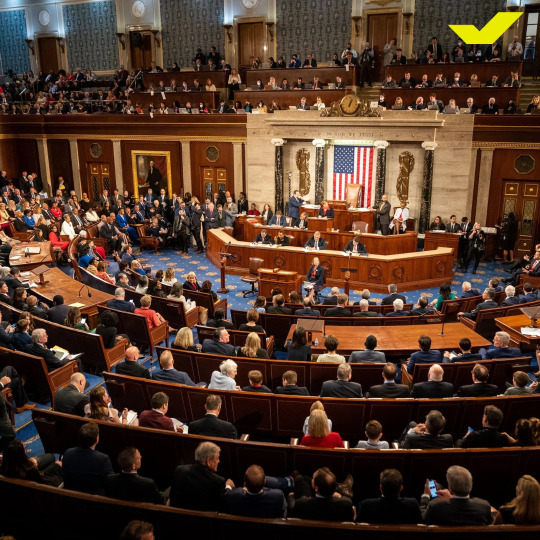
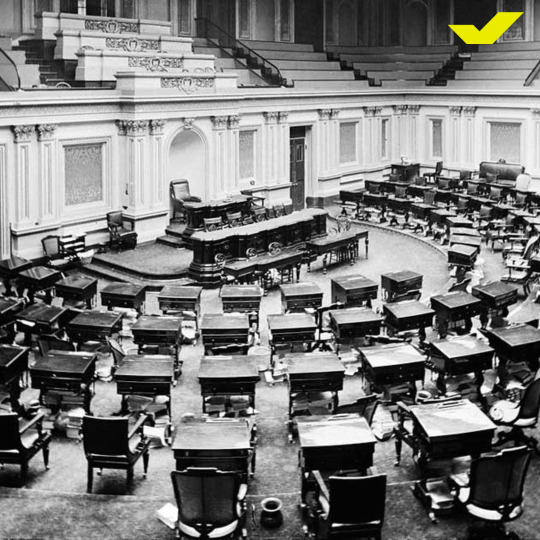
On This Day in 1913: The 17th Amendment was ratified, giving VOTERS the power to elect U.S. Senators instead of letting the state legislatures decide.
As women and people of color won the right to vote, they took their power to the ballot box and voted for Senators that better represented the diversity of our country.
The power should be in the hands of the people. ✊🏽
Exercise YOUR power at the ballot box this year. Register to vote at weall.vote/register.
#OTD#on this day#onthisday#history#1913#17th amendment#the 17th amendment#u.s. constitution#constitution#us constitution#voting#vote#senators#senator#senate#us senate#ballot box#election#elections#popular vote#popular election#diversity#power#register to vote
27 notes
·
View notes
Text
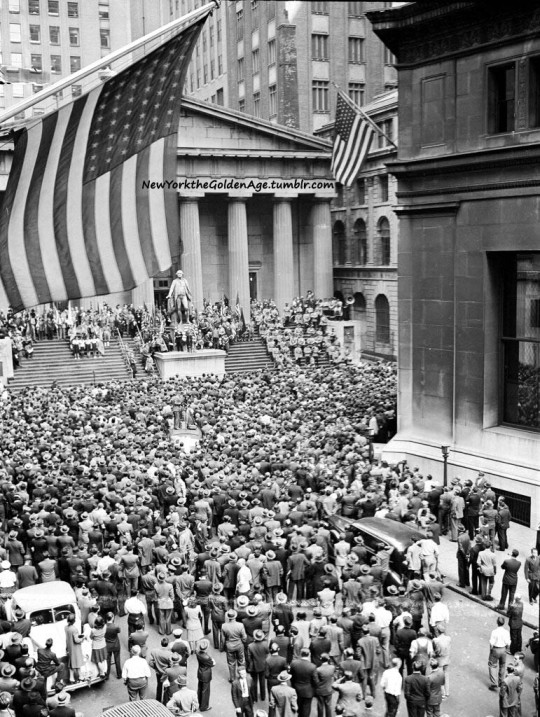
September 25, 1941 marked the 150th anniversary of the ratification of the Bill of Rights. Six thousand people turned up in front of the Sub-Treasury Building on Wall Street for the opening of the three-month celebration. (How many of them would endorse the rights contained in the constitutional amendments is another question.)
Photo: Carl Nesensohn for the AP
#vintage New Yor#1940s#Carl Nesensohn#Bill of Rights#U.S. Constitution#civil liberties#Wall St.#Sub-Treasury Bldg.#September 25#25 September#25 Sept.#Sept. 25
57 notes
·
View notes
Text
50 notes
·
View notes
Text
Elizabeth S. Hamilton at the Constitutional Convention, June 1797
Elizabeth Schuyler attended a diplomatic meeting at the age of 6; as a teenager, she hosted politicians solo; her relationship with George Washington predates Alexander Hamilton's. As a married adult, she stood in for Martha Washington, she led the Republican Court in NYC, she led charitable endeavors, and she hosted any number of national and international figures, from bankers to politicians, etc. U.S. presidents through the 1840s paid homage to her. But as so many women of the early Republic were, she was pretty deliberately erased. Particularly excised were the contributions and political activism of the Federalist wives - the amount of influence these women had could not be discussed.
And so by the late 20th century, we have historians writing that ESH didn't like politics and was sickly, usually pregnant, and often absent from her husband, but at least she tried to make a nice cozy environment for the Great Alexander Hamilton to go home and snuggle in, or something like that, as though it didn't occur to these historians that Elizabeth Schuyler likely could have married any number of wealthy, accomplished (and distant relative) men and lived a very comfortable life of luxury in Albany. And yet she looked at the super-charismatic guy who everyone said was brilliant, but with no steady income, not even a lawyer yet and with no ties to Albany, but noted as highly ambitious and said, "yep, he's the one!" Spoiler: she did it because she was ambitious herself and recognized that theirs could be a strong strategic/political partnership, in addition to a strong marriage. (I'm sure it was also good for her ego that he declared himself her best friend after only a few weeks and was so far gone he couldn't remember a military password after an evening with her.)
This erasure led to the common assumption that Elizabeth was not in Philadelphia at the Constitutional Convention in summer 1787. However, statutesandstories.com has posted about new evidence - really, a more careful examination and reading of old documents - that ESH was in Philadelphia in June 1797, and was likely in the city at the time of AH's June 18th speech to the convention. The theory is that she traveled with the Knoxes from NYC to Philadelphia, as she's mentioned in a letter from Knox that she is traveling with them, and she's definitely with AH on June 19th, as they are recorded in a journal/diary at a social engagement also attended by George Washington. Additional conjecture that this letter from AH can be more tightly dated to this period, considering these lines:
I cannot yet determine what will be our stay here and consequently I can make no determinations about my love; but I feel that it will be impossible for me to submit to a long separation however inconvenient it may be to incur the expence which will attend her coming here.
Which may align with EH borrowing money for this travel from her brother-in-law, Stephen van Rensselaer, also possibly more tightly dated to this period.
Please check out the well-cited posts (3 parts): 1, 2, and 3
Although no Hamilton biographers have discussed Eliza’s trip to the Convention in June, historians from Independence National Historic Park (INHP) concluded in the 1980s that Eliza was one of as many as nine wives who likely “attended” the Convention. Part 4 (pending) will discuss Eliza Hamilton’s relationship with the other eight wives who likely were in Philadelphia during the Convention, including Rufus King’s wife, Mary Alsop King, who was a native New Yorker.
This makes total sense to me - not just the documentation presented, but that she would have shown up to perform soft politicking/diplomacy around her husband's activities, in addition to a possible role assisting him in the drafting and editing of his speech. The daughter of Philip Schuyler and Catharine Van Rensselaer wasn't going to sit in NYC on the sidelines for this - she bolstered Hamilton not only in the ways she was personally helpful to him (emotionally, but also going over his writings and speeches with him), but through her representation of the wealthy Dutch-American interests, showing that Hamilton was a junior delegate from NY with a lot of political and financial power backing him.
As the blog states:
Yet it remains possible that Eliza may have helped her husband prepare for his one-of-a-kind speech on June 18. Moreover, it is felt that the possibility of informal, behind-the-scenes contributions by Eliza cries out for further examination.
Cause ya know, she's not discussing new threads for her needlework and thoughts on child-weaning at all these social gatherings or standing in for Martha Washington and chatting with Martha's husband about the best ways to make pastry.
And I just love if she helped advise him on a speech that only the "rich and well-born" can make a strong government. I'm sure they felt quite haughty and proud and said, "let's make another baby!" (James Alexander Hamilton was born around 9 months later.)
13 notes
·
View notes
Text
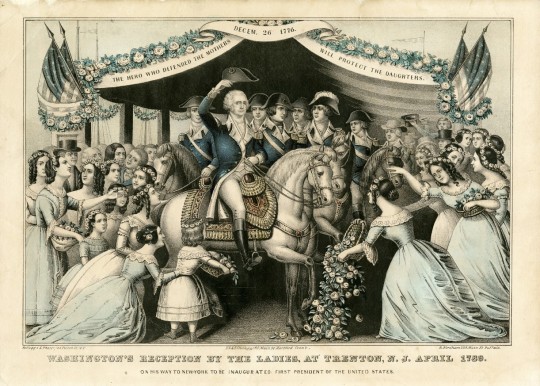
This Day in History: Washington's Call to Service
On this day in 1789, George Washington receives a letter from his friend Henry Knox. The two had been awaiting the outcome of our country’s first presidential election.
Those results were supposed to be a secret, at least until the first Congress counted the electoral votes. Naturally, word got out anyway.
“It appears by the returns of elections hitherto obtained,” Knox wrote, “which is as far as Maryland southward that your Excellency has every vote for President.”
Washington didn’t want to go, but he placed his own feelings aside.
The story continues here: https://www.taraross.com/post/tdih-washington-accepts-call
#tdih#otd#this day in history#history#history blog#America#U.S. Constitution#POTUS#presidential history#george washington#sharethehistory
11 notes
·
View notes
Text
Happy Bill of Rights Day!
Happy Bill of Rights Day! Today, we celebrate the adoption of the first ten amendments to the United States Constitution, which were added on December 15, 1791. These amendments, collectively known as the Bill of Rights, were designed to protect the fundamental rights of American citizens.
The Bill of Rights was not originally part of the United States Constitution. The Constitution was ratified by the states in 1788, but it did not include any explicit protections for individual rights. This led to concerns, particularly in the smaller states, who feared that the new government would be too powerful and violate individuals' rights.
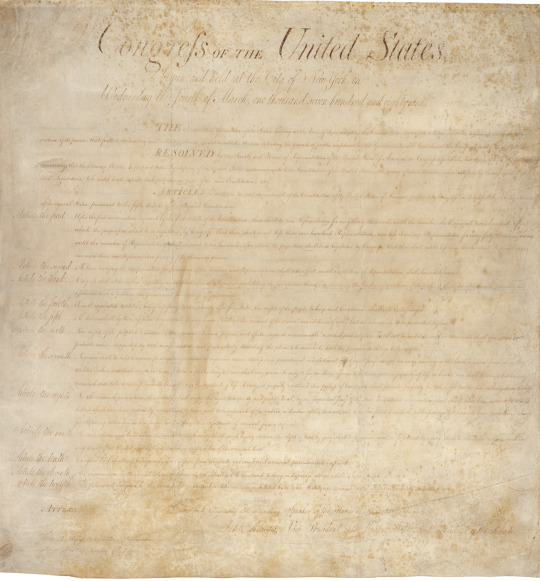
The Bill of Rights was introduced by James Madison in the first session of the United States Congress in 1789 and was ratified by the states in 1791. It contains several individual rights and protections, including the right to freedom of speech, the right to bear arms, the right to a fair and speedy trial, and the right to be free from unreasonable searches and seizures.
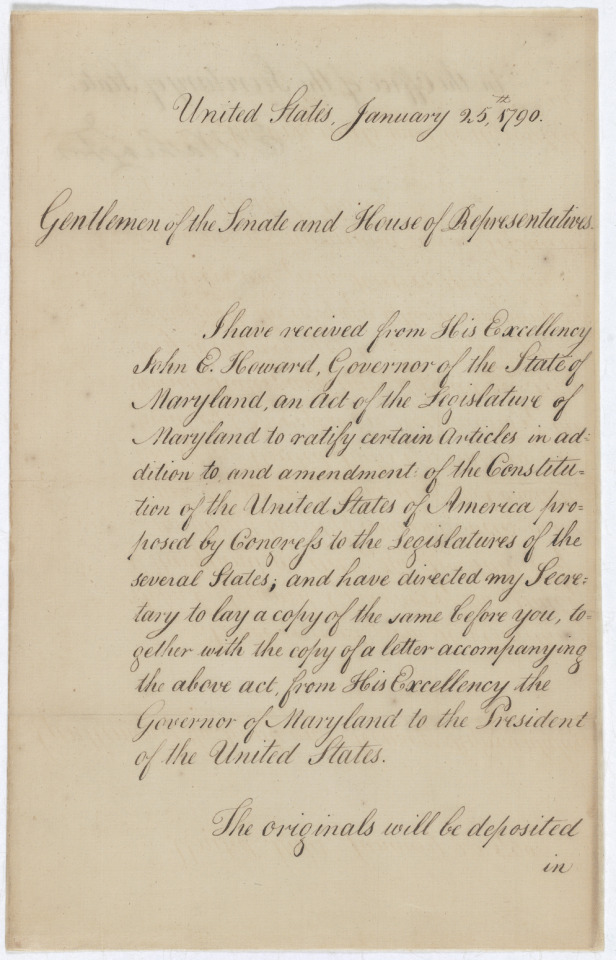
What does the #BillOfRights say? You can read a full transcript on our website: www.archives.gov/founding-docs/bill-of-rights
#DidYouKnow that the document was engrossed between September 25 and 28, 1789, and it was signed at Federal Hall in New York City on September 28, 1789. But the rest was shrouded in mystery.
Discover more about the Bill of Rights and how this mystery was solved on the Pieces of History blog:
Image 1: Bill of Rights, 1789.
Image 2: Letter from President George Washington Transmitting Copies of Maryland’s Ratification of the Bill of Rights.
71 notes
·
View notes
Text
Getting Rid of the Sokovia Accords
In the DisneyPlus streaming series, “SHE-HULK: ATTORNEY AT LAW”, the MCU finally got rid of the problematic Sokovia Accords when attorney Matt Murdock aka Daredevil revealed the Accords had finally been repealed. Considering my six-year criticism of how the MCU had introduced this legislation in “CAPTAIN AMERICA: CIVIL WAR” (one of my least favorite MCU films), utilized it in productions like “AGENTS OF S.H.I.E.L.D.”, “ANT-MAN & THE WASP”, “THE AVENGERS: INFINITY WAR”, “WANDAVISION” and “THE FALCON AND THE WINTER SOLDIER”; I was very happy to learn this about the Accords’ fate.
However . . . I find myself questioning Disney and Marvel Films’ latest decision regarding the Sokovia Accords. I have problems with its repeal or eradication. I have a problem with how Disney/Marvel Films got rid of it - via a throwaway line. For years, MCU showrunner Kevin Feige tried to tell us that there were two sides to the Sokovia Accords. I had called bullshit to that idea due to my belief that the Accords violated the U.S. Constitutional and the constitutional rights of enhanced people overall and not just the Avengers.
I had hoped that the MCU would get rid of the Accords by exploring the issue of how the Accords violated the rights of many. But the franchise never did this. Instead, the MCU rid itself of the Accords with a quick line - one that would enable the franchise to avoid discussing how WRONG the Accords were in the first place. All I can say is . . . Feige and the Disney suits are a bunch of cowards.
#sokovia accords#mcu#marvel cinematic universe#disneyplus#captain america: civil war#agents of shield#agents of s.h.i.e.l.d.#aos#ant-man and the wasp#wandavision#the falcon and the winter soldier#she-hulk: attorney at law#matt murdock#daredevil#charlie cox#anti kevin feige#anti marvel films#anti disney#anti disney studios#u.s. constitution#the avengers infinity war
129 notes
·
View notes
Note
This may be a goofy question for someone who’s blog is dedicated to the Presidency, but do you think that the U.S. Presidency is ultimately a net good for the country and the world? Should the US try a system without such a powerful executive branch?
That's not a goofy question at all, especially in 2024!
I think the American system as originally envisioned by the Founders -- with three truly equal and balanced branches of the federal government with a definitive separation of powers -- was brilliant and effective. But that's not the country we live in anymore. The three branches not only don't respect the powers of each other, but they often don't respect the powers of their own branch, which means there is no balance of power. If there's no true balance of power amongst the separate branches, the entire design flat-out doesn't work.
The problem is that this is the system and has been since 1789, so you can't really put the toothpaste back in the tube. But there are certainly many aspects of the Westminster system or even a dual executive republic like the French government that would be a more efficient and genuinely democratic way of governing a modern democracy. There are drawbacks, too, but I don't think our system is ideal when it's challenged by the petty and destructive politics of the United States in the 21st Century, which is dominated by this awful determination to actively obstruct government. There are scores of American politicians who run for office on the idea of NOT doing things and literally keeping the government progress derailed.
#Government#Federal Government#U.S. Constitution#Balance of Power#Separation of Powers#U.S. Federal Government#Democracy#Politics#Westminster System#Parliamentary Government#Dual Executive Republic#Democratic Republic#Founding Fathers
25 notes
·
View notes
Text

Constitutional Courage
How our fears endanger our future
TIMOTHY SNYDER
JAN 10, 2024
If we ignore the Constitution now, it will not protect our rights later. We are ignoring it now, because we are afraid.
The Constitution is meant to handle our emotions, to “address itself immediately to the hopes and fears of individuals,” in Alexander Hamilton’s words.
But there is one fear it cannot address: fear of the Constitution itself. Too many of us, right now, are running in fear of the Constitution.
How did it come to this? An insurrectionist, Donald Trump, purports to be running for president, although the Constitution forbids this. Section Three of the Fourteenth Amendment frankly disqualifies anyone who has taken part in an insurrection, or given aid and comfort to insurrectionists. Trump has done both, and boasts of having done both.
The authors of Section Three anticipated just such a frightful situation. An insurrectionist who swears an oath and violates it has done something terrible. He will have allies who have tasted tyranny and liked it. By mandating just how to deal with such a person, Section Three lends us strength we might not otherwise have. The Constitution defends itself by guiding us towards our better selves.
Yet Americans who should know better are choosing fear over the Constitution, finding excuses to ignore what it says. Indeed, they are choosing to fear the Constitution. Far too many politicians and other media commentators respond to our present situation -- a real insurrectionist who has tried to overthrow the Constitution while in office, a real Constitutional ban on insurrectionists running for office a second time -- by saying that it is the Constitution that must yield.
Their slogan is: “let the voters decide.” That is to say: in the case of Trump, and Trump alone, let us simply overlook what the Constitution says.
The exceptionalism reeks of fear. In no other case do we wish away the qualifications for office. There will be thousands and thousands of contested elections in the United States in November 2024. With respect to only one of them are people saying that legal qualifications for office do not matter.
The slogan “let the voters decide” makes no sense within our Constitutional order. We only have voters because we have elections, and we only have elections as organized under the Constitution. Claiming that voters (and electoral systems) can disregard the Constitution is senseless, because people become citizens and thus voters in ways defined by the Constitution. No Constitution, no citizens, no voters.
The real issue, though, is elsewhere. “Let the voters decide” appeals not to law or logic but to conformism and fear. It evades critique from within our Constitutional order because it rejects that order. Rather than following Constitutional procedures meant to handle fear, it redirects fear against those Constitutional procedures.
When we are ourselves afraid to defend the Constitution, we indulge in a kind of victim-blaming. Trump tried to overthrow the Constitution; when we say “let the voters decide,” we suggest that the Constitution deserved it. In ignoring Section Three of the Fourteenth Amendment, we refuse, as it were, to hear the Constitution's side of the story.
We are attacking the Constitution because we lack the courage to defend it. And so we begin to unwind the constitutional order.
Take the familiar example of checks and balances. The slogan “let the voters decide” suggests that potential presidents are beyond the reach of the other branches of government, despite what the Constitution says. Section Three of the Fourteenth amendment raises questions that courts will have to answer. Saying “let the voters decide” denies them that role. Section Three of the Fourteenth Amendment very explicitly defines a role for Congress after an insurrection. Congress may vote to allow an insurrectionist to take part in elections.
The point goes deeper, into the very logic of constitutionalism. Checks and balances illustrate the Constitution's capacity to transform human imperfections into decent politics. One of those imperfections is fear. When we direct our fear at the Constitution itself, however, we push those imperfections past the point where they can be borne. When we are too fearful of the Constitution to allow the Constitution to address our fears, fear builds to become the main mode of politics.
We then legitimate mob rule because we imagine some future mob. We obey a tyrant in advance. Directing our fear at the Constitution makes the tyrant's ascent far too easy.
The Constitution can defend itself in general, and even against the specific threat of an insurrectionist candidate -- but not on its own, not as a piece of paper, not without defenders who read it and affirm it. When we ignore what the Constitution says, and blame the Constitution for our own cowardice, we join in Trump's attack upon it.
It takes a little courage to admit that we are afraid, rather than to project our fears. It takes a little more courage to act, rather than dissemble and delay. If we want constitutional rule, right now is the easiest moment to mount its defense, in the way marked out by the Constitution itself.
It only gets harder from here.
5 notes
·
View notes
Text
In Tennessee, I was placed into two different state contracted group home over $20 worth of mid grade cannabis and probation violations for home invasions actually done by upper class white junkies with politically connected parents. Once I had all my panels torn out of my car as soon as I crossed into Clinton from Oak Ridge while giving a black man a ride home by a sloppy roided out Clinton “drug task force”. They accused me of drug trafficking and said they knew I had just met my dealer, who I had just texted for a personal amount of pills, manufactured by an Israeli drug company, but never met, a son of another politically connected white man who was politically who also sold crack. They could only have eavesdropped on my text messages with spy tech Israel sold them in violation of the U.S. constitution and federal law. The group homes were ran by abusive fundamentalist cults with state contracts. Everyone I brought up the illegality of this to ignored everything I said. Tennessee is a racist gestapo communist Israeli owned shithole. Oh the irony of Republicans in a Republican state complaining about communism.
#Tennessee#Israel#Oak Ridge#Clinton#ORNL#Y-12#National security#U.S. Constitution#federal law#legal#ORPD#intelligence#NSA#CIA
2 notes
·
View notes
Text
Separation of Church and State: What does the Bible say?
Scripture also supports the principle of separation of church and state (properly understood). It was these principles which informed early Baptist leaders such as John Leland and Isaac Backus and eventually lead to the passage of the First Amendment.
First, separation of church and state means that, at an institutional level, church and government are separate entities. Jesus spoke about this in Matthew 22:21 when he said, “Therefore render to Caesar the things that are Caesar's, and to God the things that are God's,” thus making a clear delineation between the “things that are Caesar’s” (the government’s) and the “things that are God’s.” Likewise, Jesus spoke of his Kingdom not being of this world (John 18:36) while simultaneously acknowledging through Paul that earthly government is established by God for our good. (Rom. 13:1-7). Jesus remains sovereign over both institutions (Matt. 28:18) until such time that he returns to rule and reign in the eschaton (Rev. 11:15). In the meantime, he gives both church and government differing tasks.
The key difference we see between the function of the church and the state comes through the use of the power of the sword. God has given government the power of the sword to punish the wrongdoer in civil matters (Rom. 13:4). The church does not have such authority (Matt. 26:51-56). On the other hand, the church can exercise church discipline in judging matters of doctrine and heresy but not the state (1 Cor. 5:1-13). Thus, there exists a healthy separation of church and state, both institutionally and functionally. This is crucial to the mission of the church, which is the preaching of the gospel. We cannot bring about conversion through the power of the sword vested in the state. Only through the power of God’s Spirit can someone be brought unto saving faith in Jesus Christ. “For though we walk in the flesh, we are not waging war according to the flesh. For the weapons of our warfare are not of the flesh but have divine power to destroy strongholds.” (2 Cor. 10:3-4)
Practically, this works out much as it is articulated in the First Amendment to the U.S. Constitution. No religious institution is privileged above another, neither is religion privileged above nonreligion. Similarly, the government does not prohibit the free exercise of someone’s faith.
~ Neal Hardin
55 notes
·
View notes
Text
By Ralph Nader
Common Dreams Opinion
Sept. 9, 2023
Our national charter needs amending to deal with big corporations, which in turn requires a mass movement.
The headlines on climate catastrophes are becoming more informative as they become more ominous. For years the media headlines have been describing record floods, droughts, wildfires, heatwaves, hurricanes and other fossil-fueled disasters of an abused Mother Nature. The immediate human casualties are devastating.
Very recently, the headlines have been steering us toward what happens in the aftermath of natural disasters in afflicted regions around the world.
The Washington Post yesterday front-paged a huge headline “Climate-Linked Ills Threaten Humanity,” followed by the sub-headline: “Pakistan is the epicenter of a global wave of climate health threats.” The reporters opened their long analysis with almost biblical language: “The floods came, and then the sickness.”
The record heat wave and flooding that left one-third of Pakistan under water have unleashed “dark clouds of mosquitoes” spreading malaria. Food supplies were reduced by drenched fields unable to grow crops. The article depicted a world map with color-coded measures of dangerous heat waves. The Indian sub-continent is registered as having one of the longest annual heat-intense periods. Over 40 million Pakistanis will endure dangerous heat for over six months a year “unless they can find shade… Extreme heat, which causes heatstroke and damages the heart and kidneys” is just one consequence.
Our Constitution never once mentions “corporation” or “company” – it only speaks of “We the People” and “persons.”
Dengue fever surged in Peru. Canadian wildfires poured smoke and particulates into the U.S. triggering asthma attacks. Famine lurks in East Africa’s worst drought in 40 years, while contaminated water takes its toll on many diseases, especially horrifying for infants and young children.
Another consequence recorded by the Post with the headline “Amid Record Heat, Even Indoor Factory Workers Enter Dangerous Terrain” in Asia. Public Citizen’s Health Research Group, led by Dr. Sidney Wolfe, was a pioneer in petitioning OSHA to issue regulations to protect workers against extreme heat (See: https://www.citizen.org/topic/heat-stress/). Corporate OSHA stalled. Then the Biden Administration proposed modest regulations that are facing corporate opposition and years of delay by corporate attorneys.
Until overturned by a Texas court, Governor Greg Abbott overrode some ordinances that were passed in large Texas cities requiring drinking water breaks for construction workers laboring under 100-degree temperatures.
Abbott, arguably the cruelest governor in the United States – unless Florida Governor Ron DeSantis out-snarls him – thought he could get away with this bit of brutishness. After all, he is in Texas, where the oil and gas lobby (Exxon Mobil Et al.) is pushing to increase North American exploration, production, and burning of these well-documented omnicidal sources of global warming and climate violence.
The oil, gas and coal industry’s tentacles have encircled a majority of the 535 lawmakers in Congress to shield and maintain huge tax subsidies behind the industry’s lethal drive for increased production. Its marketeers see their profitable circular death dance intensify as hotter days lead to higher air conditioning loads.
Running berserk with their bulging profits, these giant energy companies worldwide are forging a suicide pact with an abused Mother Earth. The projections for what climate eruptions will do to humans and the natural world continue to be underestimated. The realities each year exceed scientists’ predictive models.
With no other driving value system than short-term profits, these artificial entities or companies, and corporations controlling different dangerous technologies, cannot be allowed equal justice under the law with real human beings driven by other far more important life-sustaining and morally enhancing values. For over 2000 years, every major religion has warned about subordination by the merchant class of civilized values. The great “soft energy” or renewable energy prophet and physicist, Amory Lovins, put this critical declaration in modern, secular language when he wrote: “Markets make good servants, but bad masters.”
Our Constitution never once mentions “corporation” or “company” – it only speaks of “We the People” and “persons.” Our national charter needs amending to deal with big corporations, which in turn requires a mass movement. Since ravaging corporations impact people with indiscriminate harm, not caring whether the victims are liberals or conservatives, the political prospect for a decisive left/right coalition is as auspicious as ever.
Tens of millions of hard-pressed American workers have given up on themselves securing a government that works for them, instead of for short-sighted, greedy corporations.
The pressure for such a coalition is growing daily. Insurance companies, citing climate disaster claims, are skyrocketing homeowners and auto insurance premiums, or worse, either redlining areas or altogether pulling out of some states such as Florida. Some coastal areas will soon be private insurance deserts, requiring entry by state-run insurance coverage, at least for reinsurance purposes.
Overpaid insurance company CEOs are starting to demand bailouts without even guaranteeing coverage for consumers.
Faster and faster, the second, third and fourth waves of after-effects of these man-made natural disasters will become all-enveloping punishers of societies that are failing to head off the looming dangers, now maturing into evermore desperate states of living.
On Capitol Hill, a domestically paralyzed Congress only comes together every year to hoopla its bipartisan mega-billion-dollar additions to the bloated, unaudited Pentagon budget – taking over half of the entire federal government’s operating budget. Congress regularly gives the Generals more than they request.
Meanwhile, back home, tens of millions of hard-pressed American workers have given up on themselves securing a government that works for them, instead of for short-sighted, greedy corporations. These Americans continue to ignore the historically validated truth – no more than one active percent of the citizenry, representing the majority public opinion, can quickly make a large majority of those 535 Congressional Senators and Representatives fight first and foremost for the public interest.
Our work is licensed under Creative Commons (CC BY-NC-ND 3.0). Feel free to republish and share widely.
RALPH NADER
Ralph Nader is a consumer advocate and the author of "The Seventeen Solutions: Bold Ideas for Our American Future" (2012). His new book is, "Wrecking America: How Trump's Lies and Lawbreaking Betray All" (2020, co-authored with Mark Green).
Full Bio >
#climate crisis#climate emergency#climate change#fossil fuels#u.s. constitution#corporate power#corporate greed#ralph nader
41 notes
·
View notes
Video
youtube
New Rule: The Truth About Christmas | Real Time with Bill Maher (HBO)
2 notes
·
View notes